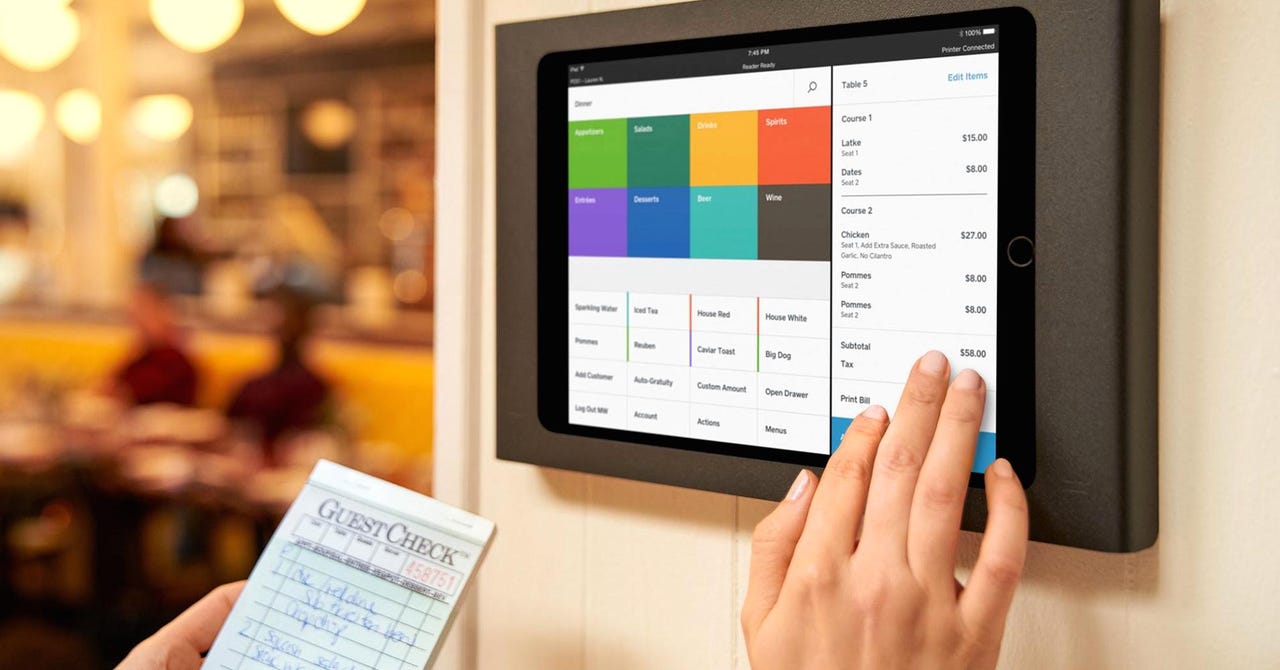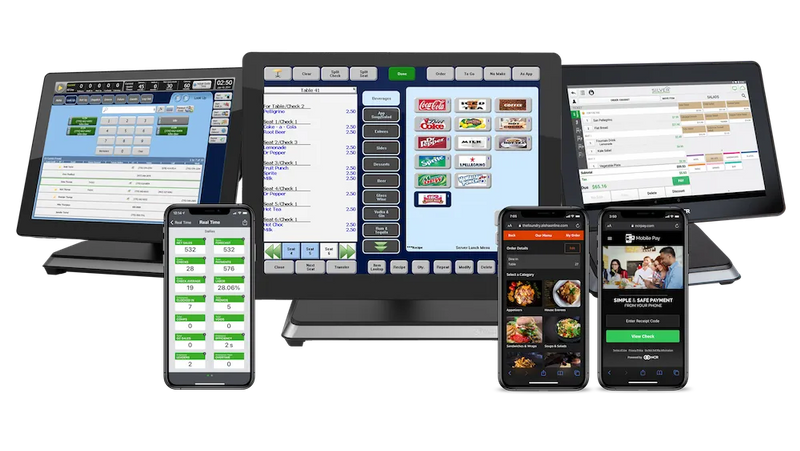Why small restaurants can benefit from Restaurant POS Software tools
Comprehending the Value of POS Software in Modern Retail Procedures
In today's retail landscape, the function of POS software has ended up being increasingly considerable. These systems have actually transformed from fundamental money signs up to multifaceted tools that boost different aspects of procedures. They not only streamline deals yet additionally supply insights that can form business techniques. Understanding just how these systems influence customer experience and supply management is necessary for any kind of store seeking to stay affordable. The implications of these advancements require further exploration.
The Advancement of POS Software: From Deal Processing to Comprehensive Solutions

Enhancing Customer Experience Through Advanced POS Includes

Streamlining Stock Monitoring With Integrated POS Systems
Integrated POS systems play a crucial role in simplifying inventory administration by automating procedures that commonly required significant hand-operated effort. These systems enable stores to track stock levels in actual time, getting rid of disparities that typically occur from manual supply counts. With functions such as barcode scanning and automatic supply replenishment informs, companies can maintain perfect stock levels without overstocking or stockouts.Furthermore, integrated POS systems assist in precise forecasting by examining historic sales data, enabling merchants to make educated investing in choices. This anticipating capability aids services adapt to changing customer demands and seasonal fads much more effectively.Additionally, the centralization of supply information throughout numerous sales networks boosts exposure, making it possible for merchants to manage their stock more successfully. Inevitably, the combination of POS systems right into supply monitoring simplifies operations, reduces human mistake, and adds to enhanced earnings.
Real-Time Sales Tracking and Coverage for Informed Decision-Making

Accurate stock administration prepares for effective sales tracking and reporting. Real-time sales tracking enables stores to check sales performance as it occurs, giving instant insights into client acquiring patterns and fads. This capability permits companies to react promptly to fluctuations sought after, maximizing supply levels and minimizing overstock or stockouts.Moreover, incorporated POS systems assist in the generation of comprehensive records, highlighting crucial metrics such as sales by classification, time periods, and specific products. Such coverage abilities equip retailers to make data-driven decisions, determining effective approaches and locations needing improvement.
The Duty of POS Software in Client Relationship Management
POS software plays an important function in improving customer partnership administration by making it possible for merchants to implement tailored advertising techniques. By examining consumer information, services can tailor promos and communications to fulfill private choices. Furthermore, these systems help with the advancement of enhanced commitment programs that motivate repeat business and enhance customer interaction.
Personalized Advertising And Marketing Techniques
As stores progressively seek to improve client loyalty and interaction, individualized advertising and marketing strategies have emerged as a crucial part of reliable customer partnership administration. POS software plays a crucial function in this procedure by accumulating and examining client data, making it possible for sellers to tailor advertising efforts to specific preferences and shopping habits. By leveraging insights from acquisition histories, sellers can produce targeted promotions and customized communications that resonate with consumers, fostering a deeper connection. Furthermore, the integration of POS software with customer relationship management systems permits seamless monitoring of customer communications, guaranteeing that advertising and marketing strategies remain pertinent and prompt (Restaurant POS Software). This data-driven technique not just boosts customer complete satisfaction but likewise drives sales and encourages repeat business, strengthening the seller's market position
Boosted Loyalty Programs
Merchants are significantly recognizing the relevance of loyalty programs in cultivating long-term customer relationships and improving total interaction. POS software plays an important function in the advancement and management of these programs, enabling sellers visit here to track consumer purchases, choices, and habits efficiently. By leveraging information analytics, businesses can develop individualized benefits and incentives that reverberate with specific customers, thus raising involvement in commitment programs. Additionally, POS systems allow smooth integration with mobile apps and digital platforms, assisting in very easy accessibility to incentives and promos. This not only improves client satisfaction but also drives repeat business. Ultimately, POS software empowers sellers to cultivate deeper connections with their customers, changing periodic customers right into dedicated clients through targeted and significant involvement methods.
Integrating POS Systems With Ecommerce Operating Systems for Omnichannel Success
To achieve true omnichannel success, seamless assimilation between point-of-sale (POS) systems and shopping systems is vital. This assimilation enables retailers to merge their stock management, guaranteeing that item accessibility is properly mirrored across both online and physical shops. Consumers benefit from a natural purchasing experience, where they can quickly change in between channels without coming across discrepancies.Furthermore, integrated systems promote real-time data sharing, allowing organizations to examine consumer habits and preferences much more efficiently. This data-driven approach permits merchants to customize advertising and marketing strategies and optimize supply degrees, eventually improving consumer contentment and driving sales.Additionally, the ability to process deals throughout platforms simplifies operations, decreasing the risk of mistakes and boosting general efficiency. As stores progressively take on omnichannel techniques, the assimilation of POS systems with e-commerce platforms continues to be a crucial variable in achieving sustainable development and keeping competitive benefit in the vibrant retail landscape.
Future Trends in POS Innovation and Their Influence On Retail Operations
As retail operations progress, future trends in POS technology are established to reshape the landscape substantially. The increase of cloud-based options, developments in mobile POS systems, and the benefits of AI combination are among the crucial developments anticipated to boost efficiency and customer experience. These improvements guarantee to simplify processes and cultivate a more dynamic retail atmosphere.
Cloud-Based Solutions Rise
With the boosting dependence on modern technology, cloud-based POS solutions are transforming retail procedures by providing boosted flexibility and scalability. These systems allow stores to gain access to real-time information from anywhere, facilitating much better decision-making and client solution. By leveraging cloud framework, companies can lower upfront prices you could try this out connected with software and hardware setups while making certain smooth updates and maintenance. Furthermore, cloud-based services sustain multi-location monitoring, allowing stores to synchronize stock and sales across different electrical outlets easily. This adaptability is important in today's busy market, where consumer choices change rapidly. As more stores take on these solutions, they can anticipate enhanced functional performance and an extra responsive technique to market demands, ultimately boosting client fulfillment and loyalty.
Mobile POS Innovations
The evolution of retail technology proceeds to shape procedures, especially with the increase of mobile POS technologies. These systems enable retailers to process transactions anywhere within the shop, boosting consumer involvement and streamlining checkout procedures. Mobile POS remedies boost stock management by enabling instantaneous accessibility to supply levels, helping staff help clients a lot more successfully. On top of that, they promote tailored purchasing experiences with incorporated client information and commitment programs. As mobile devices end up being significantly innovative, retailers are taking on features such as contactless payments and electronic invoices, furthermore optimizing the acquiring journey. The change in the direction of mobile POS not only increases functional performance yet also aligns with the expanding consumer preference for convenience, ensuring that stores remain competitive in a rapidly progressing market.
AI Assimilation Benefits
AI assimilation represents a transformative jump in POS technology, offering merchants a myriad of advantages that boost functional efficiency and customer experience. By leveraging artificial intelligence algorithms, sellers can analyze buying patterns and enhance inventory management, decreasing waste and stockouts. In addition, AI-powered analytics give customized advertising suggestions, allowing targeted promotions that raise customer interaction and commitment. Furthermore, chatbots and digital aides enhance client service, enabling quicker resolution of inquiries and enhancing the general shopping experience. Predictive analytics can also forecast need fads, making it possible for smarter staffing and resource appropriation. Inevitably, the assimilation of AI in POS systems equips retailers to make data-driven decisions, promoting an one-upmanship in an ever-evolving retail landscape.
Regularly Asked Inquiries
What Are the Costs Related To Executing POS Software?
The expenses associated with applying POS software can consist of software licensing costs, hardware expenses, installation charges, training costs, and recurring upkeep. Each variable adds to the general investment needed for a successful execution.
How Can Small Retailers Benefit From POS Systems?
Tiny stores can benefit from POS systems with boosted transaction effectiveness, structured inventory management, and improved client understandings. These systems make it possible for better decision-making, ultimately leading to raised sales and client complete satisfaction in affordable markets.
What Hardware Is Required for a POS System?
A common POS system requires essential equipment components, including a touchscreen screen, money drawer, barcode scanner, receipt printer, and repayment terminal. These aspects function with each other to promote reliable transaction handling and stock monitoring for sellers.

Can POS Software Be Custom-made for Particular Retail Demands?
POS software can without a doubt be company website customized to meet particular retail requirements. Restaurant POS Software. This versatility allows organizations to tailor attributes, user interfaces, and coverage tools, enhancing operational performance and offering an extra personalized experience for both personnel and customers
Just How Protected Is Customer Information in POS Systems?
The security of client information in POS systems differs widely. Many systems implement security, secure accessibility controls, and routine updates, yet vulnerabilities can still exist, demanding recurring alertness and positive measures from merchants to protect sensitive info.